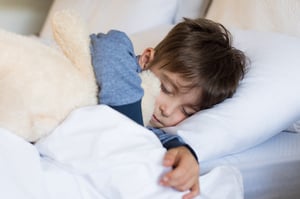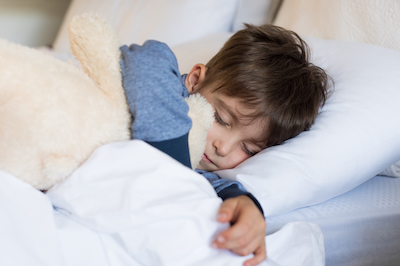
As summer break winds down and the school year begins, it’s important to make sure your child is on a good sleep schedule, getting the amount of rest that he or she needs to be productive and focused.
A lack of sleep can lead to multiple behavioral problems, from tantrums to other forms of emotional outbursts, difficulties in focus, challenges when it’s wake time in the morning, defiant behavior, hyperactivity, excessive talking and more. Your child may have exceptionally long nap times, too, which then leads to difficulty falling asleep at night — a vicious cycle
If your kindergartener is still on a summer schedule, you can try switching his or her bedtime in one fell swoop—but, that doesn’t always work. A gentler option is to make bedtime half an hour earlier each night until you’re where you need to be.
If your kindergartener, for example, wasn’t going to bed until 9 p.m., then it should take three nights to get him or her to a 7:30 p.m. bedtime that provides the right amount of sleep for the busy school day ahead.
Unique Kindergarten Situation
If you have young children who have already been in elementary school, they will likely experience some transitions as they go back to class, but at least they’re already familiar with the school routine. Young children who are just starting kindergarten, though, may struggle more with the transition, especially if they’ve been used to staying home or going to a half-day preschool program.
If your child needs more help with the kindergarten transition, here are non-sleep-related tips that can help.
More Healthy Sleep Tips
It’s important to maintain a regular sleep schedule, with relaxing bedtime routines. This could include a soothing bath, brushing their teeth and a special bedtime story. Some children will try to extend their bedtime routines in an attempt to stay up later. In that case, it can make sense to provide some flexibility while also setting boundaries. An extra bedtime story might be OK, for example, but not two more.
It’s also important that your child gets the right amount of sleep time. According to the American Academy of Pediatricians, children who are 3 to 5 years of age should get 10 to 13 hours of sleep each day, including any nap time. (These are the updated recommendations for healthy sleep by the National Sleep Foundation.) If you provide an hour of sleep for nap time, then this means that young children heading to kindergarten should be getting nine hours of sleep at night as a minimum.
Although it can be tempting to let your child use electronic devices to wind down before bedtime, whether that’s television or a computer, this usually has the opposite effect. Why? The blue lights in the screens suppress melatonin production in our brains — and this hormone is needed for healthy sleep.
Keep your kindergartener away from handheld electronics for at least two hours before sleep time, and stop watching television at least an hour before bedtime.
Watch for Sleep Problems
If your child is regularly having difficulty falling asleep, he or she may need some extra help. Watch to see if your kindergartener is struggling to fall asleep, or if he or she wakes up often, and talk to your child’s teacher to see if sleep problems are affecting school participation. If so, it may make sense to talk to your pediatrician about your child’s sleep schedule challenges to brainstorm solutions.




